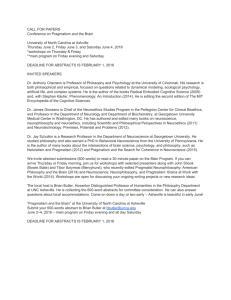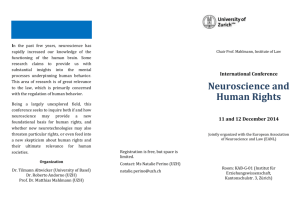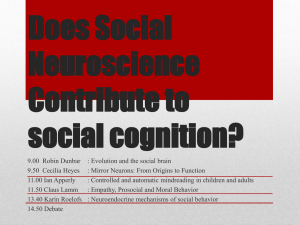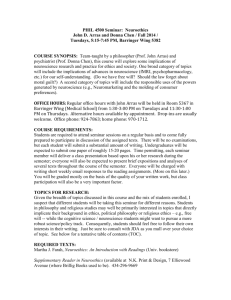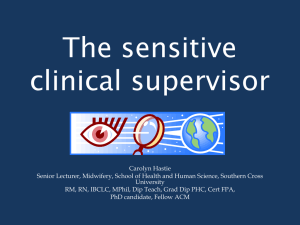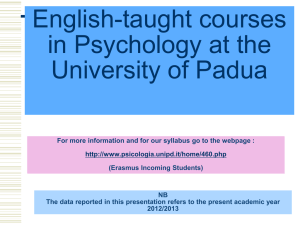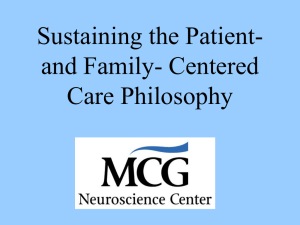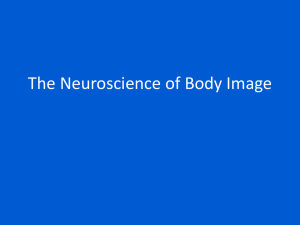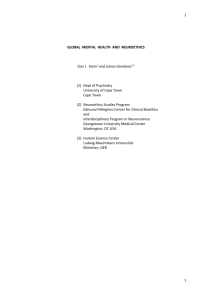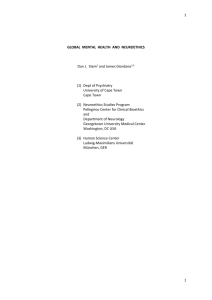European Association for Neuroscience and Law
advertisement
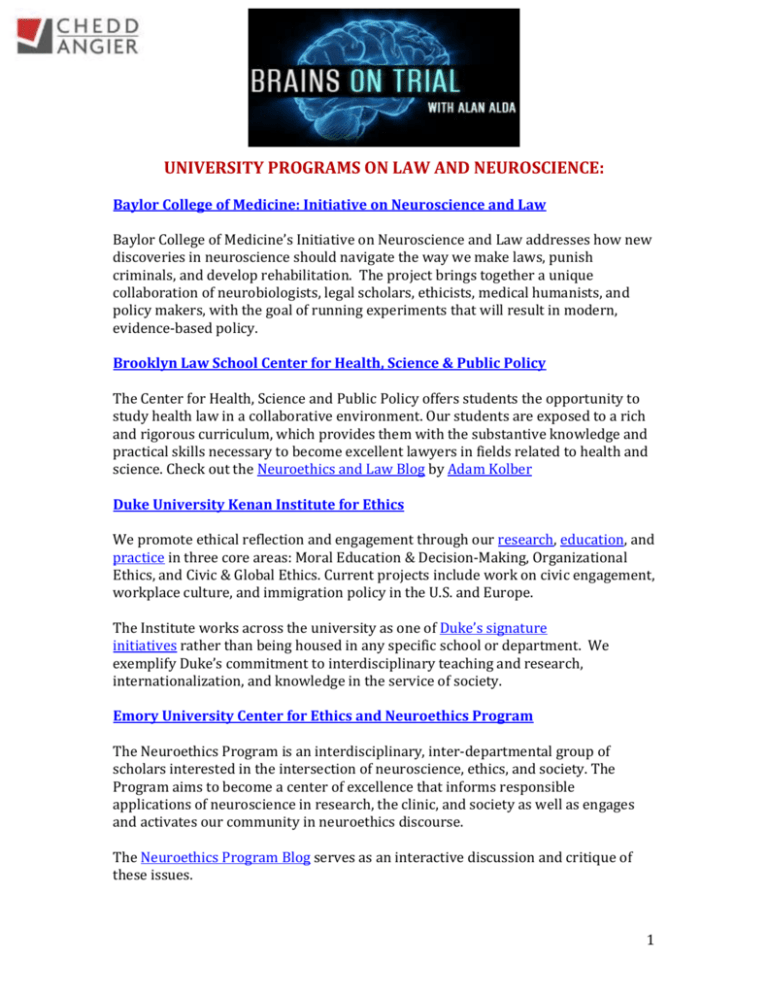
Brains on Trial UNIVERSITY PROGRAMS ON LAW AND NEUROSCIENCE: Baylor College of Medicine: Initiative on Neuroscience and Law Baylor College of Medicine’s Initiative on Neuroscience and Law addresses how new discoveries in neuroscience should navigate the way we make laws, punish criminals, and develop rehabilitation. The project brings together a unique collaboration of neurobiologists, legal scholars, ethicists, medical humanists, and policy makers, with the goal of running experiments that will result in modern, evidence-based policy. Brooklyn Law School Center for Health, Science & Public Policy The Center for Health, Science and Public Policy offers students the opportunity to study health law in a collaborative environment. Our students are exposed to a rich and rigorous curriculum, which provides them with the substantive knowledge and practical skills necessary to become excellent lawyers in fields related to health and science. Check out the Neuroethics and Law Blog by Adam Kolber Duke University Kenan Institute for Ethics We promote ethical reflection and engagement through our research, education, and practice in three core areas: Moral Education & Decision-Making, Organizational Ethics, and Civic & Global Ethics. Current projects include work on civic engagement, workplace culture, and immigration policy in the U.S. and Europe. The Institute works across the university as one of Duke’s signature initiatives rather than being housed in any specific school or department. We exemplify Duke’s commitment to interdisciplinary teaching and research, internationalization, and knowledge in the service of society. Emory University Center for Ethics and Neuroethics Program The Neuroethics Program is an interdisciplinary, inter-departmental group of scholars interested in the intersection of neuroscience, ethics, and society. The Program aims to become a center of excellence that informs responsible applications of neuroscience in research, the clinic, and society as well as engages and activates our community in neuroethics discourse. The Neuroethics Program Blog serves as an interactive discussion and critique of these issues. 1 Brains on Trial George Mason University Center for Advancing Correctional Excellence ACE! conducts collaborative and creative research to assist policy makers and correctional practitioners with using evidence-based practices and treatments. We work with our partners in crafting new policies focused on preventing criminal behavior instead of simply responding to it. Harvard University Project on Law and Mind Sciences This is a resource for scholars, students, and citizens with an interest in understanding the implications of social psychology and other related mind sciences for law and policy. You can also visit our popular and award-winning blog, The Situationist. Harvard Initiative on Law and Philosophy Working at the intersection of law and philosophy, Harvard University has been home, for more than a century, to some of the greatest theorists in the history of the American Academy. New York University Center for Research and Crime Justice The Center for Research in Crime and Justice stimulates and promotes criminal justice research at New York University School of Law and aims to make the Law School a regional, national and international base for the study and debate of criminal justice policy. The Center strives to create opportunities for students to engage in collaborative research projects. Brennan Center for Justice at New York University School of Law The Brennan Center for Justice at New York University School of Law is a nonpartisan public policy and law institute that focuses on the fundamental issues of democracy and justice. Our work ranges from voting rights to campaign finance reform, from racial justice in criminal law to Constitutional protection in the fight against terrorism. A singular institution — part think tank, part public interest law firm, part advocacy group — the Brennan Center combines scholarship, legislative and legal advocacy, and communications to win meaningful, measurable change in the public sector. 2 Brains on Trial University of Pennsylvania – Center for Neuroscience and Society Our faculty played a key role in the founding of the Neuroethics Society and continue to hold positions on its governing board. We also serve on the editorial boards of the journals Neuroethics and AJOB-Neuroscience, and provide the Journal of Cognitive Neuroscience with its Associate Editor for Neuroethics. For a complete list of collaborators for this and other programs, click here: Rutgers Law School Camden Institute of Law and Philosophy The primary purpose of the Institute is to further the mission of the Law School and Rutgers University, and in particular to advance knowledge and understanding of philosophically significant legal topics, both in normative legal theory and in analytical jurisprudence. Stanford University Center for Biomedical Ethics As a research team, we are devoted to the new field of neuroethics, with an initial focus on issues at the intersection of medical imaging and biomedical ethics. These include ethical, social, and legal challenges presented by advanced neurofunctional imaging capabilities, the emergence of cognitive enhancement neurotechnologies and pharmacology, self-referral to health care and imaging services, incidental findings, and fetal MRI. New initiatives are underway in regenerative medicine, neurogenetics and pediatric neuroethics. Law and Neuroscience at Vanderbilt University Law and Neuroscience at Vanderbilt, headquarters of the MacArthur Foundation Research Network on Law and Neuroscience (see below), is a leading institution for the study of law and neuroscience. Whether enrolled in law, neuroscience, psychology, or the nation’s first joint JD/PhD program in Law & Neuroscience, students at Vanderbilt have access to unparalleled opportunities at the law/neuroscience intersection. Coursework provides introductions and firm foundations. Faculty afford students opportunities to customize independent studies, to contribute to brain-scanning experimental design and research, and to assist in preparing and revising the first Law & Neuroscience coursebook (forthcoming 2014). This page serves as a gateway to learning more about Vanderbilt's central role in the emerging, exciting, and important new field of Law & Neuroscience. 3 Brains on Trial Vanderbilt University MacArthur Foundation Research Network on Law and Neuroscience The Research Network on Law and Neuroscience, supported by the John D. and Catherine T. MacArthur Foundation, addresses a focused set of closely-related problems at the intersection of neuroscience and criminal justice: 1) determining the law-relevant mental states of defendants and witnesses; 2) assessing a defendant’s capacity for self-regulating his behavior; and 3) assessing whether, and if so how, neuroscientific evidence should be admitted and evaluated in individual cases. Yale University Liman Public Interest Program The Arthur Liman Public Interest Program supports the work of Yale law students and Yale law school graduates through Liman Fellowships as well as undergraduate students from Yale College, Barnard College, Brown University, Harvard University, Princeton University and Spelman College, all of whom work to respond to problems of inequality and to improve access to justice. STUDENT GROUPS Harvard University Student Association for Law and Mind Sciences University of Pennsylvania, Center for Neuroscience and Society, Law and Brain Student Group SIGNAL: Stanford University Interdisciplinary Group in Neuroscience and Law University of Southern California Neuroscience and Law Society Vanderbilt Interdepartmental Group in Law and Neuroscience INTERNATIONAL LAW AND NEUROSCIENCE RESOURCES British Neuroscience Association European Association for Neuroscience and Law (EANL) European Center for Law, Science and New Technologies French Neurolaw 4 Brains on Trial International Neurolaw Institutes of Neuroscience, Mental Health, and Addiction (Canada) National Core for Neuroethics, University of British Columbia NeuroEthics Women Leaders Oxford Centre for Neuroethics, University of Oxford Swiss Network of Neuroscience, Ethics and Law (SNNEL) University of Tübingen, Centre for Integrative Neuroscience 5
